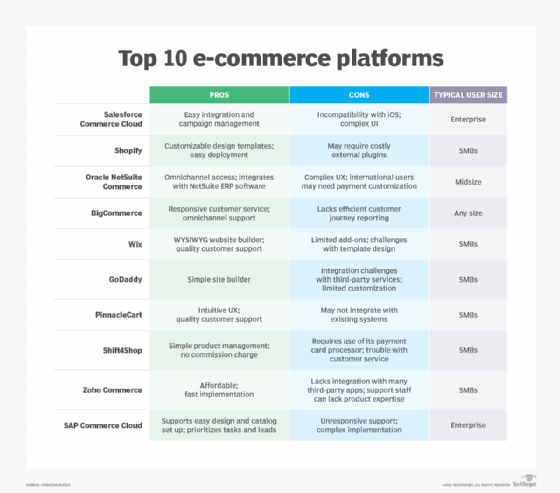
Getty Images/iStockphoto
Top 10 e-commerce software companies
E-commerce platforms can help organizations design and operate engaging online shops. Companies like SAP have offerings for large enterprises, whereas GoDaddy and Wix target SMBs.
As the online shopping landscape grows, organizations need e-commerce software that can handle large order volumes, offer exceptional CX and streamline back-office operations.
Billions of people embrace e-commerce and some analysts expect the online marketplace to virtually double in size by 2025. As the industry becomes more competitive, organizations with outdated e-commerce software may struggle to seize a decent share of the market. In addition to inventory management features, an e-commerce platform should have SEO tools, social commerce features and a smooth mobile experience.
After examining several professional and user reviews, the following 10 e-commerce software companies, which include as Salesforce, Shopify and GoDaddy, stood out to help organizations meet their demands. Explore their standout features, challenges, who they work best for and pricing information.
1. Salesforce Commerce Cloud
As a flagship Salesforce product, Salesforce Commerce Cloud offers both B2C and B2B versions. Organizations can integrate the B2C version with social media selling channels like Instagram and Facebook. The platform also includes personalization features, AI-powered recommendations for shoppers, A/B testing and the ability to launch campaigns and promotions.
Salesforce claims Commerce Cloud can help businesses of any size, although large enterprises and existing Salesforce customers may benefit the most due to the complementary Salesforce products with which it can integrate.
Pricing is available upon request and typically includes an annual charge based on users' sales.
Pros: The platform has effective campaign management features and integrates well with other apps. Salesforce has many other products that can work with Commerce Cloud, which enables users to see all their organization's data in a single system.
Cons: Commerce Cloud can have performance issues as it loads price books, compatibility issues with iOS and has a complex UI.
2. Shopify
Shopify offers an e-commerce platform for SMBs. It enables users to build out entire storefronts and product listings, and includes SEO features, e-mail marketing and promotions management. Users can also use point-of-sale (POS) terminal features to sell products in person or through social media.
In addition, Shopify offers Shopify Plus for large enterprises with high transaction volumes, and Shopify Lite, which enables small businesses to add products to their blogs or websites and accept credit card payments.
Shopify Plus starts at $2,000 per month, while the Lite version is $9 per month. The Basic Shopify plan starts at $29 per month.
Pros: Shopify offers a straightforward UX, responsive customer service and customizable design templates. Additionally, the standard version offers quick and easy deployment.
Cons: Users can't access and edit content easily, so they may need to purchase third-party plugins -- for instance, a plugin that enables users to purchase multiple products with one click -- to extend functionality. Additionally, the multicurrency features for international customers can be confusing.
3. Oracle NetSuite Commerce
Oracle NetSuite Commerce offers web store, order management, inventory and accounting services. The software targets medium-sized businesses and departments within larger companies. It includes automation, real-time reporting, e-mail marketing and a mobile app option.
Pricing is available upon request and typically includes an annual license fee for the core platform, add-on modules, number of users and an initial setup fee.
Pros: The platform offers an omnichannel experience, reliable uptime and NetSuite ERP software integration.
Cons: NetSuite Commerce has a complex UX and may require customization for features like their payment system -- especially for some international users.
4. BigCommerce
BigCommerce includes SEO, marketing, online store creation and web hosting features. The software accommodates multiple storefronts and headless commerce -- a type of e-commerce architecture that decouples back-end commerce functions from the front-end UI for design flexibility. BigCommerce also offers customizable design templates, integration with WordPress, social commerce and brick-and-mortar POS terminal support.
Pricing is available upon request.
Pros: BigCommerce has responsive customer support, omnichannel support, third-party integrations and a drag-and-drop storefront builder.
Cons: BigCommerce requires custom development for app integrations, including with web content management systems like WordPress and various API clients. Also, reporting doesn't always reflect the customer journey.
5. Wix
Some people consider Wix a website builder, but its online store-building features make it a top e-commerce software company for businesses -- particularly those new to online retail. It offers typical e-commerce features: templates to build out stores, a dashboard, e-mail marketing, multistore support, SEO and social media selling integration.
Pricing starts at $27 per month for the Business Basic plan.
Pros: Wix offers a WYSIWYG website builder, templates and image bank. Additionally, it has responsive customer support.
Cons: The software has limited add-ons and users may struggle to customize templates. Users who want to build large storefronts may want to explore other options because Wix better suits small businesses.

6. GoDaddy
GoDaddy is another website builder service with e-commerce features. It has website templates to help SMBs build out online stores. Additionally, it offers in-person payment integration, integration with third-party marketplaces such as Etsy and Facebook, and marketing tools to create social media ads, improve SEO and send targeted e-mails.
Pricing starts at $9.99 per month for the Basic plan with a website, marketing features and payments. That price doesn't include per-transaction fees.
Pros: GoDaddy offers easy implementation and reliable uptime. Also, its simple website builder can help less-experienced users.
Cons: The platform could use more customization features, and it doesn't always integrate well with third-party services, such as Google's tag management system. It also lacks reliable customer support.
7. PinnacleCart
PinnacleCart offers standard e-commerce features: SEO tools, pre-designed and customizable storefront templates; product listing features like reviews and price filters; connections with third-party apps such as QuickBooks and Shopzilla; and the ability to sell products on Amazon, Facebook, eBay and other e-commerce sites.
Pricing starts at $79.95 per month for its Standard plan.
Pros: PinnacleCart offers easy set-up and an intuitive UX. It also offers helpful customer support and smooth customization.
Cons: Users may struggle to integrate PinnacleCart into their existing systems. It also doesn't offer as many pre-made design templates as other e-commerce platforms.
8. Shift4Shop
Formerly known as 3dcart, Shift4Shop bills itself as an all-in-one e-commerce software platform that enables users to build websites and storefronts for free, which is ideal for small businesses and entrepreneurs. It includes templates, e-mail marketing, SEO features and support for mobile commerce.
Users in the U.S. who use Shift4Shop's payment card processor get the service for free. Otherwise, plans start at $29 per month.
Pros: The platform enables users to add multiple product variations and doesn't charge for every transaction. It also comes with built-in features that other e-commerce software requires plugins for, such as product reviews.
Cons: Shift4Shop requires customers to use its payment card processor. Also, some users have reported unresponsive customer service and poor integration with accounting software.
9. Zoho Commerce
Zoho Commerce targets SMBs and enables users to build e-commerce websites with a WYSIWYG interface. The platform also includes other features, such as inventory management, SEO, e-mail marketing and reporting functionality.
Pricing starts at $22 per month for the Commerce Starter plan.
Pros: Zoho Commerce offers affordable prices and quick implementation. The platform also offers an intuitive UX.
Cons: The platform doesn't integrate with various third-party apps or payment gateways. Support staff doesn't always have product expertise, and the UI tends to lag.
10. SAP Commerce Cloud
SAP Commerce Cloud works well for large enterprises with high transaction volumes that want to optimize performance with AI-powered product recommendations and A/B testing. It includes built-in workflows, promotions capabilities, the ability to manage multiple product catalogs and storefronts, and a WYSIWYG website editor.
Pricing is available upon request.
Pros: SAP Commerce Cloud can seem complicated at first, but once users learn it, they can easily design, set up catalogs and prioritize tasks and leads. The platform also integrates with other SAP products.
Cons: The platform's customer support is lacking, and new users may need an implementation partner to answer questions. New users may need time to adjust to its complex UI.







